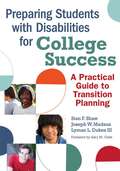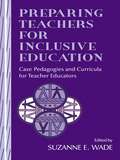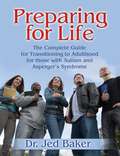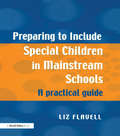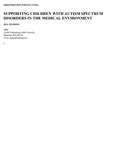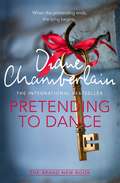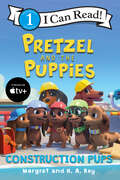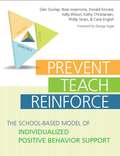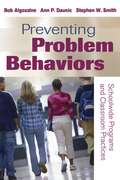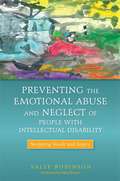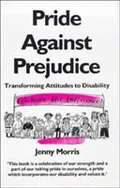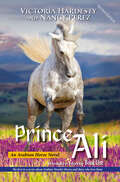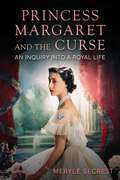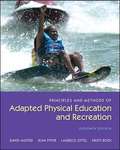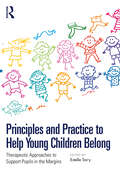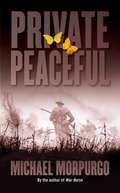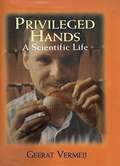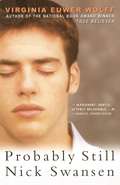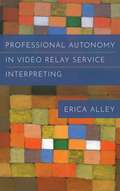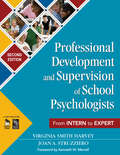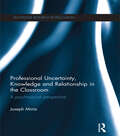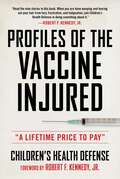- Table View
- List View
Preparing Students with Disabilities for College Success: A Practical Guide to Transition Planning
by Joseph W. Madaus Stan F. Shaw Lyman L DukesFor students with mild to moderate, non-visible disabilities, navigating a college education without the support team they had in high school can be challenging. Help students become effective self-advocates and maximize their postsecondary possibilities with this cutting-edge book, which balances current research with the most practical guidance to date on this topic.
Preparing Teachers for Inclusive Education: Case Pedagogies and Curricula for Teacher Educators
by Suzanne E. WadeThis book--a companion volume to Inclusive Education: A Casebook and Readings for Prospective and Practicing Teachers--is designed to assist instructors in using Inclusive Education as a text for preservice or in-service teacher education courses. Part I (Chapters 1-5) of Preparing Teachers for Inclusive Education provides a general introduction to case pedagogies and chapters describing curricula that teacher educators have developed using cases designed to prepare teachers for inclusive education. Part II provides Teaching Notes that correspond to the 14 cases in Inclusive Education.
Preparing for Life: The Complete Guide for Transitioning to Adulthood for those with Autism and Asperger's Syndrome
by Jed BakerA life skills guide for individuals with autism and Asperger's syndrome discusses social skills and strategies needed for success in the adult world, including discussion of perspective-taking, nonverbal communication skills, and stress management.
Preparing to Include Special Children in Mainstream Schools: A Practical Guide
by Liz FlavellTeachers in both special and mainstream schools have to be confident in their abilities to implement inclusion effectively, in order for the child to have any chance of a successful inclusive school career. This book demonstrates how mainstream and special schools can work together in preparing the special school child to succeed in a mainstream environment. It also shows how to prepare existing mainstream pupils and other members of staff involved in or affected by the inclusion process.The author provides photocopiable forms for evaluating pupils' academic and social process and advice on how physical resources, such as sensory rooms, can enhance the learning opportunities of all pupils. She offers jargon-free communication strategies for effective interaction with the child, which is also considered within the framework of the whole-school policy. The book also presents sample lesson plans, resource ideas and plans for daily record keeping for use across the curriculum subjects; and suggestions for ways in which special and mainstream schools can work together to enhance the whole curriculum. Any teacher in a mainstream or special school who is concerned about making inclusion really work for their pupils will find this book an invaluable companion.
Preschool Orientation and Mobility Screening: Second Edition
by Bonnie Dodson-Burk Christine RomanOutdoor Travel Skills, Gross Motor Skills, Walking Independently, Visual Skills Used for O&M, Auditory Skill, Tactile Skills, Body Image and Exploratory Behavior, Basic Positional Concepts, Home & Community Experiences, Mobility Skills - Walking with Others, Mobility Techniques - Walking Independently, Use of Mobility Devices, Orientation Skills, Background Information.
Prescription for Success: Supporting Children With Autism Spectrum Disorders in the Medical Environment
by Jill HudsonBecause of the unique needs of children with ASD, it is important to pay special attention to the details of their experience in the medical environment. Designed to help make the medical experience easier for all involved, this book presents information on ASD, the varying developmental levels, interventions, and assessments that medical staff, parents, educators, and key service providers can use to more effectively interact with and support children with ASD while in the medical setting.
Prescriptions for Independence: Working with Older People Who Are Visually Impaired
by Nora Griffin-Shirley Gerda GroffPrescriptions for Independence: Working with Older People Who Are Visually Impaired has been designed to provide comprehensive information in a clear and readable way so that visually impaired people, their friends and families, and those who work with them have simple suggestions within easy reach. Readers will find that most people who are visually impaired do have usable vision and do not require special assistance, but they will also find what they need to know about common forms of visual impairment and adaptations and information that are useful to some visually impaired people in daily life.
Pretending to Dance
by Diane ChamberlainBack Cover: "Molly Arnette and her husband live in San Diego, where they hope to adopt a baby. But the process terrifies her. As the background checks begin, Molly worries that secrets from her North Carolina childhood will resurface and destroy not only her chance at adoption but her marriage as well. She ran away from her family twenty years ago after a devastating event left her distrustful of those she loved: her mother, the woman who raised her and who--despite Molly claiming otherwise--is very much alive; her birth mother, whose mysterious presence raised so many issues, and the father she adored, whose death sent her running from the small community of Morrison Ridge. Now, as she tries to find a way to make peace with her past and embrace a future filled with promise, she discovers that even she doesn't know the truth of what happened in her family of pretenders."
Pretzel and the Puppies: Construction Pups (I Can Read Level 1)
by Margret ReyBased on the streaming series Pretzel and the Puppies on Apple TV+, this I Can Read follows the pups as they work to make sure the new Bow Wow Tower is accessible for all dogs.Welcome to Muttgomery, the nicest little city in an all-dog world, and home of Pretzel, Greta, and their five adorable Dachshund puppies: Poppy, Penny, Pedro, Puck, and Paxton. Pretzel is a peppy, playful, and always positive stay-at-home dad, and he and Greta, the mayor of Muttgomery, have a knack for encouraging their pups to follow their passions and make the world a better place!In this I Can Read book, the pups are excited to explore the newly built Bow-Wow Tower—it has binoculars so dogs can see all of Muttgomery! But the construction dogs didn't plan for pups who are too small to reach the binoculars. Luckily the Doxies are there to put their paws up and make the tower accessible to all!Pretzel and the Puppies: Construction Pups is a Level One I Can Read book, which means it’s perfect for children learning to sound out words and sentences. Whether shared at home or in a classroom, the short sentences, familiar words, and simple concepts of Level One books support success for children eager to start reading on their own.
Prevent-Teach-Reinforce: The School-Based Model of Individualized Positive Behavior Support
by Glen Dunlap Rose Lovannone Carie English Donald Kincaid Kelly Wilson Kathy Christian Phillip StrainSolve serious behavior challenges in K-8 classrooms with this easy-to-use book, the first practical guide to the research-proven Prevent-Teach-Reinforce (PTR) model. Developed by some of the most respected authorities on positive behavior support, this innovative model gives school-based teams a five-step plan for reducing problems unresolved by typical behavior management strategies. With this thorough blueprint for PTR, education professionals will learn how to prevent behavior problems by adjusting the curriculum and environment; teach proactive communication skills; and reinforce prosocial behavior and academic achievement. This highly successful model is proven effective by research and field testing in real classrooms PTR was shown to reduce behavior problems and increase evidence of social skills and academic engagement detailed and explicit, with five systematic steps that take educators beyond tips and strategies (see box) consistent with the popular positive behavior support approach and derived from the principles and many procedures of applied behavior analysis easily adaptable to the needs and goals of each individual student effective for a wide variety of students: typically developing students and those who have autism, learning disabilities, intellectual disabilities, emotional and behavioral disorders, and other challenges On the included CD-ROM are all the printable forms and tools needed to implement PTR, such as Behavior Support Plan templates and a Functional Behavioral Assessment. With this comprehensive model, education professionals will resolve even the toughest classroom behavior challenges and remove a significant barrier to effective teaching and student achievement.
Preventing Problem Behaviors: Schoolwide Programs and Classroom Practices
by Bob Algozzine Stephen W. Smith Ann P. DaunicIn today's increasingly diverse PreK-12 classrooms, problem behaviors can often interrupt instructional time and disrupt learning. Designed for 21st-century school leaders, administrators, behavior specialists, and classroom teachers, this research-based guide offers specific strategies and plans for preventing problem behavior at both the classroom and school level. Based on the premise that early response to problems can lead to better outcomes for students, the book's content is framed around four essential areas: foundations, intervention, collaboration, and evaluation. Within these areas, this accessible guide features: -The latest information on the science and practice of prevention -Reasons why conflict resolution, peer mediation, and bully-proofing are essential to prevention -Effective practices for teaching social skills to young children -Proven techniques for implementing schoolwide positive behavior support -Tools for using individual behavior plans to prevent problems -Ideas for home-school and community partnerships and culturally responsible teaching -Critical strategies for monitoring student progress and evaluating prevention practices -New, updated chapters, including information on preschool behavior support and RTI This valuable resource provides all the tools and strategies school leaders and teachers need to keep children focused on learning.
Preventing the Emotional Abuse and Neglect of People with Intellectual Disability
by Sally Robinsonxx
Pride Against Prejudice: Transforming Attitudes to Disability
by Jenny MorrisDrawing on her own and other experiences of disability, Jenny Morris, editor of Able Lives, confronts the nature of the prejudice against disabled people. Pride Against Prejudice challenges the reality of being different, covering current and historical debates on the quality of disabled people's lives; the way disability is represented within Western culture; institutionalisation and independence; feminist research and 'community care'; and the politics of the disability movement. For too long, non-disabled people have defined the experience of disability and had control over disabled people's lives. Pride Against Prejudice has grown out of the increasing collective organisation of disabled people and is part of an emerging disability culture. Jenny Morris argues her case with energy, authority and conviction.
Prince Ali: An Arabian Horse Novel
by Victoria Hardesty and Nancy PerezPrince Ali had everything: talent, charisma, and a devoted best friend, Becky Howard. He won every time he set a hoof in a show ring. He garnered more fans from personal and TV appearances. Becky was with him every step of the way, even riding him in the Swallows Day Parade in their hometown, San Juan Capistrano. Disaster struck when two thugs put Becky in a coma, drugged him and dragged Prince Ali off to sell for diabolical purposes. When their buyer realized who Ali was, he nixed the deal. That landed the pampered show horse high in the mountains in late March. One night, a week later, he discovered the corral gate unlatched. Prince Ali mustered every ounce of strength, courage, and stamina he had to walk into the wilderness searching for the best friend he couldn't live without.
Princess Margaret and the Curse: An Inquiry into a Royal Life
by Meryle SecrestA Groundbreaking New Perspective of Princess Margaret by Renowned Biographer Meryle Secrest Meryle Secrest, distinguished biographer in the arts and humanities, and recipient of a White House Medal, has turned her focus to royalty. In Princess Margaret and the Curse, she has put the conventional view of a much-reviled Princess on its head. Her latest study, which she considers more of an investigation than a biography as such, proposes that nobody knows the truth about the fabled, doomed Princess. She is the first person to have looked at Princess Margaret in a particular family context. That is to say with reference to her mother, Elizabeth Bowes-Lyon, the daughter of a famous, hard-drinking Scottish family that had inhabited an ancient dwelling, Glamis Castle, for centuries. Her older brothers were already renowned for their prowess in alcohol consumption. Decades later, once she became Queen Mother, this Elizabeth would begin to imbibe by eleven in the morning. She was already lamenting the loss of her "drinking powers" when, because of severe bouts of morning sickness during her first pregnancy with the future Queen Elizabeth in 1926, she could not drink. Four years later, while pregnant with Princess Margaret in 1930, she was not so handicapped. Doctors believed it was perfectly safe for a mother-to-be to drink, so she drank. The doctors were wrong. But it took another forty-three years, until 1973, before new studies established that alcohol in any amount was poisonous to the developing human being. The effect is lifelong. We now know that victims&’ growth is stunted (Margaret stopped growing at five feet), and their skeletal structures are fragile. They get sick sooner and age faster. There are characteristic emotional differences, too. They never develop maturity of mind. They remain subject to sudden tantrums, rages, are poor judges of character, and particularly prone to run and hide, as Princess Margaret tried to do all her life. They may be as intelligent and gifted as she was, but mulish and fly into a rage. They are, it turns out, exactly like the person she became. None of this has ever been recognized, let alone understood. With this study, the author places Margaret's life in its proper perspective. It seems particularly sad that someone expected to be perfection itself in her manners and behavior should have been born in the one situation where perfection was, in fact, impossible. It is time we looked at this public figure from a new and more forgiving frame of mind, and with a new understanding.
Principles and Methods of Adapted Physical Education and Recreation (11th Edition)
by David Auxter Carol Huettig Jean Pyfer Kristian Roth Lauriece L. ZittelProvides physical educators with up-to-date knowledge and skills to deal with all levels of students' abilities. It is the only text in the adapted physical education market that provides both task-specific and developmental teaching approaches. With the national movement to include most students with disabilities into the general curriculum, the text is designed to enable adapted and regular physical education teachers to successfully address those students' needs in the regular physical education class.
Principles and Practice to Help Young Children Belong: Therapeutic Approaches to Support Pupils in the Margins
by Estelle TarryThis vital resource for early years and primary school trainees and practitioners explores a range of social and therapeutic strategies and interventions that will successfully support all children’s sense of belonging. A sense of belonging is vital to children’s physical, emotional, psychological, mental health and wellbeing. This book considers social and therapeutic strategies and interventions that support all children’s sense of belonging and can be adopted by practitioners. It addresses the interrelated factors that impact children’s sense of belonging such as race, gender, expression of sexual orientation, religion and disabilities. It will help develop practitioners’ awareness of current social and educational issues including LGBT+ topics, the changing family unit, relationships, misogyny and toxic masculinity, meditation and mindfulness as well as the importance of children connecting with nature and transformative activism. The chapters adopt a theoretical and practical approach, presenting case studies of good practice, which will create positive and inclusive outcomes, supporting individual growth and community wellbeing.An essential reading for practitioners, including teachers, teaching assistants (continuing professional development), lecturers and social workers, working in early years and primary educational setting, this book would also be suitable as a core and supportive text for students studying on a variety of undergraduate degree courses within the scope of education, pedagogy, mental health and wellbeing, social work and child development.
Principles of Safeguarding and Protection for Learning Disability Workers
by Simon BickertonIf you are working within the learning disability sector and studying for the QCF Diploma in Health and Social Care, you will find this book invaluable in helping you to achieve the unit on Principles of Safeguarding and Protection. You will learn how to recognise and respond to signs of abuse and how to reduce the likelihood of it happening. The book is easy to navigate, with each chapter covering one of the learning outcomes within the unit. Each chapter begins with an example taken from real people's stories and lots of activities, photographs and other illustrations are included throughout.
Private Peaceful
by Michael MorpurgoAs the enemy lurks in the darkness, Private Thomas Peaceful struggles to stay awake through the night. He has lived through the terror of gas attacks, watched his friends die, and battled the rats, the mud and the sheer exhaustion of staying alert. But in the morning, Thomas will be forced to confront an even greater horror. When morning comes, the unthinkable will happen.
Probably Still Nick Swanson
by Virginia Euwer WolffSixteen-year-old learning-disabled Nick struggles to endure a life in which the other kids make fun of him, he has to take special classes, his date for the prom makes an excuse not to go with him, and he is haunted by the memory of his older sister, who drowned while he was watching.
Professional Autonomy in Video Relay Service Interpreting (Gallaudet Studies In Interpret #17)
by Erica AlleyVideo relay service (VRS) is a federally funded service that provides telecommunications access for deaf people. It is also a for-profit industry with guidelines that may limit the autonomy of the sign language interpreters who work in VRS settings. In this volume, Erica Alley examines how VRS interpreters, or “Communication Assistants,” exercise professional autonomy despite the constraints that arise from rules and regulations established by federal agencies and corporate entities. Through interviews with VRS interpreters, Alley reveals the balance they must achieve in providing effective customer service while meeting the quantitative measures of success imposed by their employer in a highly structured call center environment. Alley considers the question of how VRS fits into the professional field of interpreting, and discovers that—regardless of the profit-focused mentality of VRS providers—interpreters make decisions with the goal of creating quality customer service experiences for deaf consumers, even if it means “breaking the rules.” Her findings shed light on the decision-making process of interpreters and how their actions are governed by principles of self-care, care for colleagues, and concern for the quality of services provided. Professional Autonomy in Video Relay Service Interpreting is essential reading in interpreter education courses and interpreter training programs.
Professional Development and Supervision of School Psychologists: From Intern to Expert
by Virginia Smith Harvey Joan A. StruzzieroEssential for fostering the professional development and enhanced competency of school psychologists, this book discusses administrative and clinical supervision and offers vignettes, assessment tools, and methods for evaluating professional growth.
Professional Uncertainty, Knowledge and Relationship in the Classroom: A psychosocial perspective (Routledge Research in Education)
by Joseph MintzThe extent to which teachers should make use of theoretical and expert knowledge as opposed to tacit experiential knowledge, and how these might be combined, is a perennial issue in discussions on pedagogy. This book addresses these debates through a creative development of the concept of productive uncertainty.Using case studies focusing on teachers working with children with autism, a particularly fertile crucible for considering uncertainty, the book explores how the radical 20th century psychoanalyst Wilfred Bion's epistemological approach to uncertainty can be used to re-frame Donald Schön's concept of reflection in action, offering a new perspective on the practice of teachers and other caring professionals. Several areas of potential uncertainty are identified, including uncertainty relating to areas of practice including diagnosis, the relationship between expert knowledge and practice, the implications of autism for autonomy and agency, and uncertainties in relation to the understanding of and use of new technologies. A strong argument is made, based on both theoretical and empirical grounds, that in juggling between theoretical and tacit knowledge in the classroom there is more to be gained by staying with the struggle with uncertainty than by fleeing from it too early, into the promise of expert solutions. Consideration is also given to the relative importance of specific theoretical training for teachers, both in general and in relation to working with children with special educational needs, in the context of international and UK policy developments in this area.This book will be of key value to researchers and postgraduates in the fields of education studies, teacher thinking and research, psychoanalytically informed psychosocial studies, as well as to practitioners working in special educational needs/autism education.
Profiles of the Vaccine-Injured: "A Lifetime Price to Pay" (Children’s Health Defense)
by Robert F. Kennedy Jr. Children's Health DefenseAre vaccine injuries really &“one in a million,&” as governments and public health experts constantly tell us? This comprehensive look at the evidence by Children&’s Health Defense, illustrated by nine real-life stories of serious vaccine injury, exposes health agencies&’ soft-pedaling of vaccine risks as a dangerous lie. For most people, the potential risks of vaccination, which include life-changing illness, family bankruptcy, and even death, are invisible and almost inconceivable—until a vaccine injury happens to them. Through the poignant and riveting stories of nine injured children and adults, Profiles of the Vaccine-Injured by Children&’s Health Defense communicates the devastating impacts of vaccine damage on health, family finances, relationships, and more. As the book&’s introductory chapters show, vaccine injuries—whether from a routine childhood injection—or a travel vaccine—or a COVID-19 shot—are common, not rare. Discussing US children&’s poor showing in global health rankings, the book assembles compelling evidence pointing to childhood vaccination as a key &“elephant in the room.&” The heart of the book resides in the vaccine injury stories told by mothers of injured children and injured adults. Conveying in vivid detail what it&’s like to live with conditions such as severe autism, chronic pain, and immune systems gone haywire, the nine individuals also attest to the disturbing fact that &“when it comes to vaccine injuries, there&’s no help legally or financially—you&’re on your own.&” In addition, they share affecting accounts of gaslighting, a lack of answers or solutions and outright hostility from the medical community, social isolation, heavy financial burdens, and interrupted careers and lives. Exposing the truth behind the vaccine safety myth, Profiles of the Vaccine-Injured makes vaccine injury personal and demonstrates that we ignore vaccine risks at our peril.
